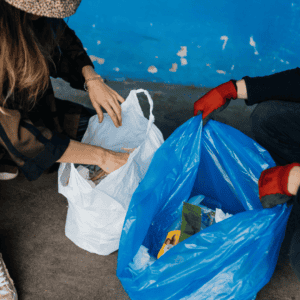Workplace Recycling: How To Navigate The New Legislation

The Welsh Government has introduced new legislation that looks set to usher in a new era of environmental responsibility and waste management across workplaces in Wales. As an experienced specialist in total waste management, we’ve pulled together a quick, easy-to-read guide to help you navigate smoothly through these challenging changes. Here’s a breakdown:
What’s Changing
Coming into effect on 6 April 2024, all businesses in Wales will be obligated to separate recyclable materials into their individual waste streams. Co-mingled waste, also known as ‘Dry Mixed Recycling (DMR)’, will no longer be accepted and recyclable materials thrown into General Waste bins will also have to be separated.
Why
These changes form part of Wales’s commitment to achieving a national target recycling rate of 70% recycling and becoming a net zero, zero waste nation by 2050. By extending the lifecycle of recyclable materials and re-processing them ethically and sustainably, we can create economic opportunities, save costs (like avoiding landfill taxes), whilst also contributing to a circular economy.
At Printwaste, we’ve long stood by promoting single-stream recycling as this method of disposal retains the quality required for optimal recycling or reuse. Co-mingled waste often carries a risk of cross-contamination, effecting the recyclability of materials and hindering the recycling process. Therefore, separation at source is key to providing the most sustainable outcome for both the product and our environment.
Who’s Affected
This legislation applies to all workplaces, including businesses, public institutions, and third-sector organisations. This change will also extend to waste collectors and transporters who deal with workplace waste, as they are also required by the new regulations to keep waste separated during the collection and transportation process.
What Needs to Be Separated
The Welsh Government has outlined waste must be separated into the following 7 core categories:
- Food waste (for premises producing over 5kg per week)
- Paper and Cardboard
- Glass
- Metal, Plastic and Cartons
- Small waste electrical and electronic equipment (WEEE)
- Textiles
- Non-recyclables – items must be placed in a designated general waste bin
To further support recycling efforts and waste separation, the new legislation prohibits:
- Sending separated recyclable materials for incineration (energy from waste) or landfill
- Disposing of food waste in sewers, or maceration units in sinks or kitchens
- Sending wood waste to landfill
Helping you prepare:
At Printwaste, we’re on-hand to help your business transition into these new regulations with our consultative approach to waste management. Here’s how we can help you prepare:
- Complete a waste audit – Waste management varies from business to business. Therefore, the best place to start is by reviewing your waste stream mix against the Severn core categories. Using our free waste consultancy service, we will guide you through this process by reviewing:
- The types of waste your business currently produces and in what volumes
- How the waste is currently stored and how often it’s collected
- The current onward processing route
- Obtain guidance on best practice – Using 40+ years of industry expertise, our team will provide recommendations on the most suitable and sustainable solution for your business.
- Installing a compliant service – We’re offering single-stream bagged recycling services to all our customers who require an additional solution to their general waste service. In addition, we’re providing a range of storage container options and sizes including secure lockable consoles for confidential waste as well as bags, bins and larger containers for our recycling and waste services.
Staying up-to-date with legislative business waste management can be a challenge for any business. We provide comprehensive guidance on responsible, performance-driven waste management. Contact Printwaste today for your free waste audit on 01242 588600 or at https://www.printwaste.co.uk/contact-us/.


